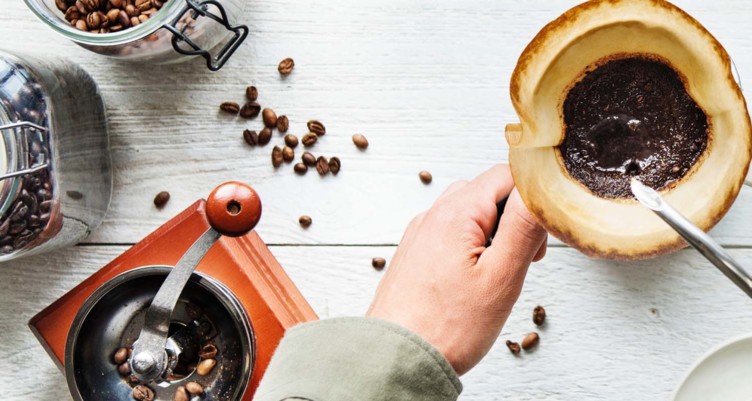Coffee to Come With Cancer Warnings, Rules Calif. Judge

If you live in California, you may soon see a cancer warning on your coffee’s packaging — but don’t spit your coffee out just yet. A California judge recently ruled that coffee companies must display a warning that coffee comes with a cancer risk. The ruling imposed on 91 coffee companies[1] calls acrylamide, a chemical found in coffee, into question. According to the American Cancer Society, acrylamide increases rodents’ risk for cancer when added to their drinking water.[2] California’s Safe Drinking Water and Toxic Enforcement Act requires all businesses to provide warnings whenever they expose consumers to a running list of known carcinogens.
While acrylamide is in fact found in coffee, it’s also found in tons of other foods — and in much higher doses. The kicker: Most of those other foods don’t require health warnings.
What is acrylamide?
Acrylamide is used in industrial processes to make plastic and paper, and it’s also found in cigarette smoke. Acrylamide forms in coffee during the roasting process; lighter roasts have higher acrylamide content levels than darker roasts. This is due to the fact that acrylamide content peaks earlier in the roasting process and decreases in later stages.[3]
However, coffee is not the only source of acrylamide. When many food starches are heated above 250 degrees Fahrenheit, a chemical reaction between certain sugars and an amino acid (asparagine) occurs, forming acrylamide. This natural byproduct is found in a host of roasted, toasted, and baked foods — from French fries to baked goods to toast. It gives them their distinctive brown crust and warm flavor.
Acrylamide levels are much lower in coffee than in food
CNN reports that the California court decided coffee contains a “high amount” of acrylamide. Detractors, however, argue that coffee contains very little acrylamide, compared to other food items that don’t require cancer warnings. A 2013 study[4], for instance, found that roasted coffee contains about 179 micrograms per kilogram (µg/kg), or approximately .45 µg per cup. However, one slice of toasted wheat bread contains between 11 and 161 µg/kg acrylamide; while a slice of toasted rye bread contains 27 to 205 µg/kg of acrylamide.[5] That is nearly 450 times more acrylamide in a slice of bread than in a cup of coffee; and no warning label is required in the case of the bread.
For comparison, rodents in the study consumed between 1,000 to 10,000 times more acrylamide than they would normally get from their food. Furthermore, research shows that drinking coffee is linked to lower risks of cancer.[6] The same can’t be said for French fries or bread.
How to remove acrylamide from your diet
To reduce your exposure to acrylamide in foods, worry less about coffee and more about foods that contain high levels of the carcinogen and have no redeeming health properties.
A traditional paleo diet is a solid place to start, but it still possesses more toxins than you might think. In fact, if you aren’t benefiting or getting results on paleo, you may not be able to handle the toxin load of the diet. Following the Bulletproof Diet eliminates 99 percent of all toxins — not just acrylamide.
Foods highest in acrylamide include potato products like French fries and potato chips, and grain-based foods such as breakfast cereals, cookies, and toast. On the Bulletproof Diet, all of these foods are considered kryptonite and should be avoided.
Cook at lower temperatures
To avoid acrylamide in your food, cook at lower temperatures. As The Ultimate Bulletproof Diet Roadmap of Cooking Methods illustrates, high heat produces carcinogens, including acrylamide, through a chemical reaction called lipid oxidation. If you consume rancid or oxidized oils, for instance, your body is confronted by free radicals that react adversely to the oxygen and will damage your cells and can cause cancer. In fact, research demonstrates that lipid oxidation forms acrylamide.[7]
So, do yourself a favor and consume fewer carcinogens by cooking at lower temps. Specifically, frying causes the highest acrylamide formation; roasting food causes less acrylamide formation; followed by baking. Boiling food does not create acrylamide.
Megadose with vitamin C
Combat oxidative stress and protect against carcinogens by megadosing with vitamin C. It’s been 40 years since Nobel laureate Linus Pauling suggested that vitamin C can prevent cancer, and now further research shows that vitamin C inhibits the growth of some tumors.[8] To that end, pioneering holistic medicine doctor and chief medical officer Ron Hunninghake of the cancer-centric Riordan Institute, developed new cancer treatment protocols using elevated dosages of vitamin C with promising results.
“We have the Riordan protocol for cancer where we start people out at a relatively small dose of 15,000.” says Hunninghake. The goal is to get cancer patients to 400 milligrams per deciliter. Hunninghake emphasizes that the key to tackling cancer with vitamin C is getting the correct dose for the specific condition and individual. That, he says, results in better human functioning, aka a disease-free life. Learn more about megadosing with vitamin C for cancer on this Bulletproof Radio (iTunes) podcast with Dr. Hunninghake.
Get your daily dose of vitamin C even if you don’t have cancer
Even if you don’t have cancer, you still should supplement with vitamin C. Studies show you can take up to 120 grams of vitamin C a day with virtually no side effects, though you may experience diarrhea.[9] Supplementation of at least 500 mg per day is optimal, though you can take more if you suffer from chronic infections.
Dose: 1-2 grams / day
Forms: Ascorbic acid crystals or time release capsules
Timing: Morning and evening, but it’s best not to take it after a workout as isolated antioxidants can negate the insulin sensitivity gained from exercise.
Recommended brand: Solaray
Sign up for early access to sales, product launches, the latest Bulletproof news and more!



